Arts & Entertainment
Pride march brings gayborhood boom years back to Chelsea
‘We will continue what began 50 years ago, to bring us closer to equality’
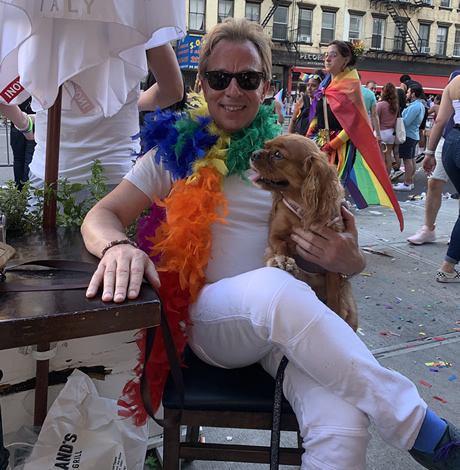
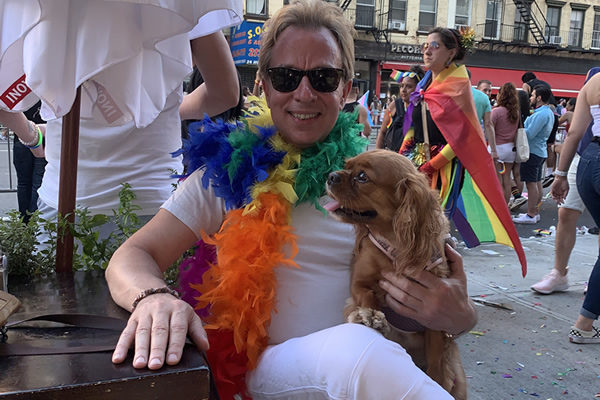
From long lines to get into gay bars to crowded sex shop aisles to sidewalks dense with drag queens, daddies, dykes, twinks, tweakers, and wide-eyed tourists, Manhattan’s onetime ground zero of gayness had a déjà vu moment that lasted all day long, and well into the next, when Chelsea served as the end point of June 30’s NYC Pride March.
Cheered on by an estimated four million spectators, the March proceeded down Fifth Avenue from its East 26th Street kick-off, went past the Stonewall Inn during its Greenwich Village phase, then made its way up Seventh Avenue, concluding in the heart of Chelsea.
Twelve hours and 32 minutes after its noon start time, over 150,000 marchers had crossed the West 23rd Street finish line, from which point many remained in the area to congregate on stoops, hold impromptu dance-offs, and scoop up Stonewall 50 T-shirts hawked by vendors who turned side streets closed to vehicular traffic into open-air markets.
Some strolled, many strutted, down Eighth Avenue, between West 14th and 23rd Streets—which, at the height of Chelsea’s gay glory, housed dozens of queer-centric businesses, including gay lifestyle retail mecca Rainbows & Triangles, and The Big Cup—a java joint that served the community as, depending on your pop culture touchstone, the “Cheers” bar, Central Perk, Starbucks, or a brick and mortar Grindr, where hookup prospects were never more than 20 feet away.
By dawn, the streets were clean, and little evidence of the previous day’s record-setting revelry remained, save for the Pride-hued confetti that promises to linger, like Christmas tree needles, as a reminder of the season that came and went.
For longtime locals, the Pride March recalled an era when Chelsea was the reigning queen of NYC gay nightlife, retail, and residency.
“I consider the heyday of the Chelsea gay vibe to be when I moved here [in 1996] to until around 2005,” says 49-year-old Stephen Charles Lincoln, creator/proprietor of The Protein Bakery, a neighborhood fixture since 1999.
WorldPride, Lincoln notes, “was a fantastic reminder” of the heyday, “with the streets filled with gay people of every race, age, and sexual preference.”
While the onetime group fitness director at the predominantly gay David Barton Gym strongly disavows the notion that Chelsea is “over” as a gay neighborhood (“I’m still here,” he quips), Lincoln concedes it “has definitely diluted over the past 10 years.”
Unlike Splash, Rawhide, and View, not every gay bar from Chelsea’s golden age has been consigned to history.
Sixty-year-old Derek Danton, “an out business owner for 40 years, 20 with the Eagle NYC,” says there is “really nothing in my history to compare to the events of the last two weeks. Locals and visitors alike were just happy to be alive, happy to be free to express themselves, unconditionally.”
Located at West 28th Street and 11th Avenue since 2001, and one of the only Manhattan gay bars with a roof deck, the Eagle is set to mark its 50th anniversary next year.
“In its storied history,” Danton notes, “the size of the crowds at the Eagle, because of WorldPride, is unprecedented… It is astonishing to realize that so many thousands of visitors from all around the world know and love the Eagle, and that tradition is still valued.”
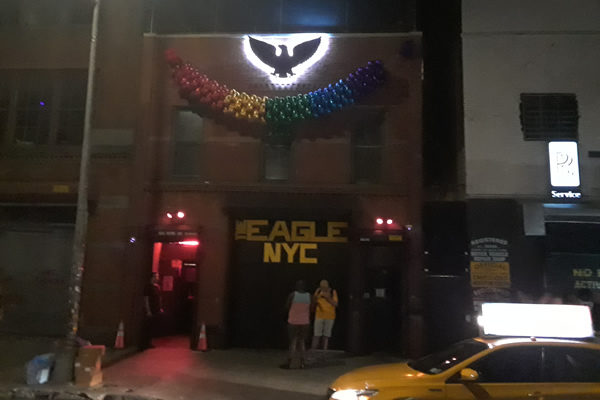
Andrew Rai, 38, a lifelong resident of Chelsea, talks of vanishing tradition, noting he feels the March “retains some of the rapidly fading cultural authenticity” of his neighborhood.
“Chelsea,” Rai says, “was very gay when I was growing up, was very vibrant, in terms of the variety of personalities, genders, and thoughts. Now, it’s becoming very homogenized. But this really harkened me back to when Chelsea was truly diverse. It makes me feel that there’s still some element of it, somewhere, that lives.”
Fifty-one-year-old Craig M. de Thomas, a partner in the Midtown-based commercial and residential title insurance company, Insignia National Title Agency, recalls “telling my grandmother I was gay when I was 25 years of age,” and often traveling “from upstate New York, to indulge in the gay life that is offered here. I have fond memories of going to the many Chelsea clubs, bars, and restaurants, truly enjoying life and always feeling safe and accepted. Seeing men openly sharing affection and being their authentic selves in public was incredible to me. I wanted to be part of that, which is why I moved here 11 years ago.”
Over the last few years, de Thomas observes, “We have seen Chelsea shift, as many gay business owners and residents have moved north [to Hell’s Kitchen].” This year’s Pride celebration, he says, “brought with it a much-needed injection of gayness to Chelsea. It was lovely to walk around over the weekend, both day and evening, and feel the gay energy again, to see restaurants, bars, and shops filled with life and happiness. It was a vibe that is reminiscent of days gone by.”
Calling the Pride March the “culmination of seeds sown decades ago, many of which were planted here in Chelsea by residents who still reside here,” de Thomas sees the neighborhood’s gay liberation greenhouse role as an ongoing one, noting, “We are the fruits” of those seeds and, as such, “will continue what began 50 years ago, to bring us closer to equality” while celebrating “the beauty and power of diversity.”
That Chelsea diversity has legs—four of them, in the form of many locals for whom Sunday’s Parade March intersected with the daily duties of dog ownership.
Chicago-to-NYC transplant Abbey Stolle spoke with the Blade while walking her Shih Tzu, Donna, in close proximity to their residence at 21st Street and Seventh Avenue, where one of the event’s green-shirted volunteers held a sign letting March participants know they were two blocks from the route’s end.
“People want to feel joy. They want to feel love,” she says, of the neighborhood’s sudden population explosion. “I’ve been out here all day. No one I know living here has ever complained [about the crowds brought by the March], and I have a mixed bag in my building—young, old, gay, straight, trans.”
Detroit-born Stolle, 37, spoke with this 52-year-old reporter about his having grown up during the height of the AIDS crisis, and put her own experience within the context of “my era, Matthew Shepard, that fear of coming out in the ’90s. I was a raver for 15 years. Gay men took me under their wing.”
As “a straight white woman,” Stolle notes, “I guess I feel a bit inferior on a day like today. This is a weighted year. These are people,” Stolle said, of the Stonewall-era faces in the March and on the streets, “who’ve lived through so much, who are still living here.”
Clarifying her use of that charged word, Stolle says she did not invoke inferiority “in a negative way. It’s just, it’s not my day. What are my woes compared to some of the strife these people are going through? But I’m a woman, so I get that taste, that sprinkle.”
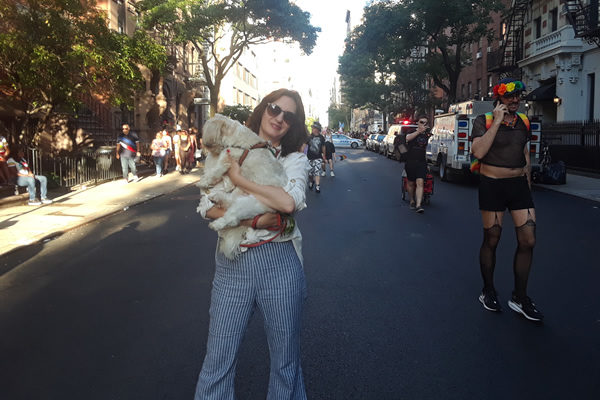
Having watched the day’s events from a table outside Cafe Champignon (Seventh Avenue between West 21st and 22nd Streets), de Thomas recalls, “I stated to my darling friends, gay and straight, as we were sitting in the midst of millions of celebrants, ‘I absolutely love that this is our normal. Isn’t it fantastic?’ ”
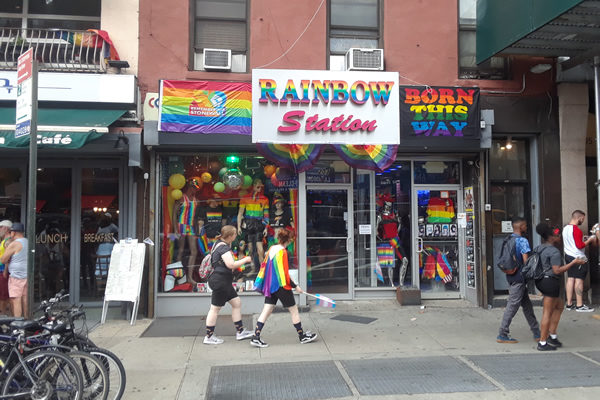
Arts & Entertainment
Win a pair of tickets to Grace Jones & Janelle Monáe @ The Anthem on June 5, 2025!
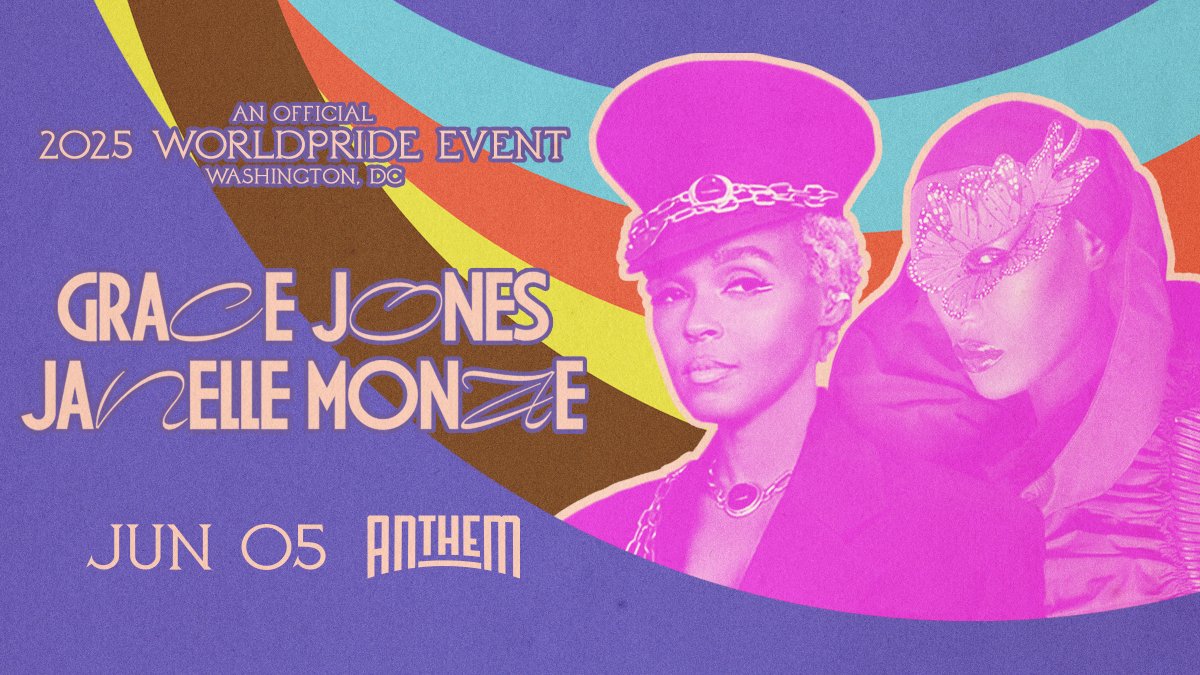

The Cherry Weekend main event party was “Fire” at Betty (1235 W Street, N.E.) on Saturday, April 12. Detox of “RuPaul’s Drag Race” met with fans.
(Washington Blade photos by Michael Key)















‘Uncle Vanya’
Through April 20
Shakespeare Theatre Company
Harman Hall
610 F St., N.W.
Shakespearetheatre.org
Shakespeare Theatre Company’s “Uncle Vanya” freshly rendered by director Simon Godwin and starring Hugh Bonneville in the title role, puts a pleasing twist on Chekhov’s tragicomic classic.
As disheveled, disheartened, and overworked Vanya, Bonneville is terrific. Though very different from the actor’s fame making role as Downton Abbey’s Lord Grantham, a proud, fastidiously turned-out aristocrat who presides over a manicured country estate peopled by a large staff, his Vanya is equally compelling
For “Uncle Vanya,” Chekhov imagines a house on a ragged estate in the Russian forest whose inhabitants display varying degrees of discontent brought on by the realization that they’re leading wasted lives. Middle-aged Vanya’s dissatisfaction and disappointment have been tempered by years of hard work. But all of that is about to be challenged.
With his plain and steadfast niece Sonya (Melanie Field), Vanya keeps the place going. And while barely putting aside a kopek for himself, he’s ensured that proceeds have gone to Sonya’s father Alexandre, a querulous academic (Tom Nelis), and his alluring, much younger second wife Yelena (Ito Aghayere) who live in the city.
When called to retire, the self-important professor and his wife economize by joining the family in the country. Overcome by the intense boredom brought on by provincial isolation, they’re not happy. Turns out, life in the sticks isn’t for them.
At the same time, the urban couple’s presence generates quite an effect on the rural household, changing the mood from one of regular work to idleness. What’s more, Vanya and family friend Mikhaíl Ástrov (John Benjamin Hickey), an unusually eco-aware, country doctor, are both bewitched by Yelena.
Meanwhile, young Sonya, who’s long carried an unrequited torch for Ástrov grows increasingly smitten. And while Yelena, who’s bored with her aging husband, expresses teasing tenderness with Vanya, she feels something more serious for Ástrov. It’s a whole lot for one house.
Superbly staged by Simon Godwin, STC’s artistic director, and performed by a topnotch cast, the very human production begins on an unfinished stage cluttered with costume racks and assorted props, all assembled by crew in black and actors in street clothes. We first see them arranging pillows and rugs for an outside scene. Throughout the play, the actors continue to assist with set changes accompanied by an underscore of melancholic cello strings.
With each subsequent scene, the work moves deeper into Chekhov’s late 19th century Russian world from the kitchen to the drawing room thanks in part to scenic designer Robert Brill’s subtle sets and Susan Hilferty and Heather C. Freedman’s period costumes as well as Jen Schriever’s emotive lighting design.
In moments of stillness, the set with its painterly muted tones and spare furnishings is a domestic interior from a moment in time. It’s really something.
Adapted by contemporary Irish playwright Conor McPherson, the work is infused with mordant wit, ribald comedy, and sadness. Like McPherson’s 2006 play “The Seafarer” in which the action unfolds among family, friends and others in a modest house filled with confrontation, laughter, resentment, and sadness. All on brand.
For much of “Uncle Vanya,” McPherson’s script leans into humor, funny slights, the professor’s pretentions, and Vanya’s delicious snarky asides; but after the interval, the play’s stakes become perilously heightened ready to explode with resentment and feelings of wasted potential, particularly frustrations expressed by Vanya and his intelligent but unfulfilled mother (Sharon Lockwood).
When it appears that mismatched couple Alexandre and Yelena are poised to depart, the house is struck with a sense of both relief and gloom.
Not everyone is disturbed. In fact, the family’s old nanny Nana (Nancy Robinette), and Waffles (Craig Wallace), a former landowner and now lodger on the estate, are elated. Both are eager to return to the pre-professor schedule of an early breakfast and midday lunch, and menus featuring simpler fare. They long for the return of the humble Russian noodle.
“Uncle Vanya”melds cynicism and hope. Like life, it’s a grasp at fulfillment.
-

 District of Columbia4 days ago
District of Columbia4 days agoWorldPride organizers may warn trans people from abroad not to attend event
-

 Opinions3 days ago
Opinions3 days agoIt’s time for new leadership on the Maryland LGBTQIA+ Commission
-

 Politics5 days ago
Politics5 days agoTrump’s battle with Maine over trans policies escalates
-

 The White House3 days ago
The White House3 days agoWhite House does not ‘respond’ to reporters’ requests with pronouns included










